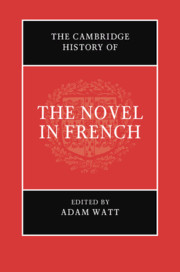Book contents
- The Cambridge History of the Novel in French
- The Cambridge History of the Novel in French
- Copyright page
- Contents
- Figures
- Contributors
- Acknowledgements
- Note on Conventions
- Chronology
- Introduction
- Part I Beginnings: From the Late Medieval to Madame de Lafayette
- Part II The Eighteenth Century: Learning, Letters, Libertinage
- Part III After the Revolution: The Novel in the Long Nineteenth Century
- Part IV From Naturalism to the Nouveau Roman
- 22 The Republic of Novels: Politics and Late Nineteenth-Century French Fiction
- 23 Medicine, Sex and the Novel: Maupassant and Rachilde
- 24 The Roman-Fleuve
- 25 Marcel Proust’s À la recherche du temps perdu
- 26 The Novel in France Between the Wars
- 27 Existentialism and the Novel
- 28 Suspicion and Novelty: The Nouveau Roman
- 29 The Holocaust and the Novel in French
- Part V Fictions of the Fifth Republic: From de Gaulle to the Internet Age
- Index
- References
23 - Medicine, Sex and the Novel: Maupassant and Rachilde
from Part IV - From Naturalism to the Nouveau Roman
Published online by Cambridge University Press: 04 February 2021
- The Cambridge History of the Novel in French
- The Cambridge History of the Novel in French
- Copyright page
- Contents
- Figures
- Contributors
- Acknowledgements
- Note on Conventions
- Chronology
- Introduction
- Part I Beginnings: From the Late Medieval to Madame de Lafayette
- Part II The Eighteenth Century: Learning, Letters, Libertinage
- Part III After the Revolution: The Novel in the Long Nineteenth Century
- Part IV From Naturalism to the Nouveau Roman
- 22 The Republic of Novels: Politics and Late Nineteenth-Century French Fiction
- 23 Medicine, Sex and the Novel: Maupassant and Rachilde
- 24 The Roman-Fleuve
- 25 Marcel Proust’s À la recherche du temps perdu
- 26 The Novel in France Between the Wars
- 27 Existentialism and the Novel
- 28 Suspicion and Novelty: The Nouveau Roman
- 29 The Holocaust and the Novel in French
- Part V Fictions of the Fifth Republic: From de Gaulle to the Internet Age
- Index
- References
Summary
This chapter focuses initially on the impact of late nineteenth-century medical theory (hysteria, hypnotism, etc.) on the novel and the burgeoning of medically-inflected fiction. Post-hypnotic suggestion led to stories of crime and sexual manipulation and introduced the figure of the unscrupulous doctor/hypnotist, usually bested by a good-hearted physician expert in hypnotism techniques. Ambient medical research on mind-control and dual identity influenced Maupassant’s fiction, most notably in his story ‘Le Horla’. Substantial tales (‘Boule de suif’, ‘La Maison Tellier’) foreshadow and feed the drama, irony and humour of Maupassant’s novels. Three of these are studied here: the raucous, ferociously ironic Bel-Ami, the family drama of illegitimacy and identity, Pierre et Jean, and a story of the despondency of ageing and lost love, Fort comme la mort. The chapter closes with a discussion of the novels of Rachilde (Marguerite Eymery), seen increasingly as an important figure of France’s decadent period. Her early novels Monsieur Vénus and La Marquise de Sade played daringly with the notion of gender reversals and sadism, exercised against men; such themes suggest today an underlying feminist persuasion, an affiliation she denied. Later novels, many-textured such as La Tour d’amour, or La Jongleuse, a male/female confrontation on seduction and love, reveal the broadening of the novelist’s talent.
Keywords
- Type
- Chapter
- Information
- The Cambridge History of the Novel in French , pp. 421 - 438Publisher: Cambridge University PressPrint publication year: 2021



